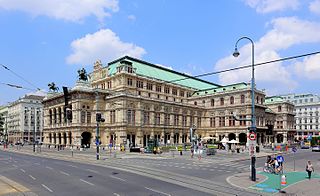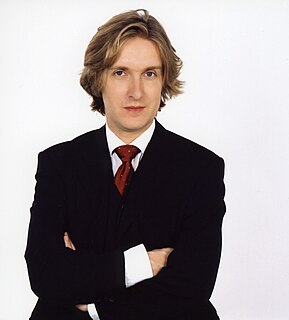
Georg Philipp Telemann was a German Baroque composer and multi-instrumentalist. Almost completely self-taught in music, he became a composer against his family's wishes. After studying in Magdeburg, Zellerfeld, and Hildesheim, Telemann entered the University of Leipzig to study law, but eventually settled on a career in music. He held important positions in Leipzig, Sorau, Eisenach, and Frankfurt before settling in Hamburg in 1721, where he became musical director of the five main churches. While Telemann's career prospered, his personal life was always troubled: his first wife died only a few months after their marriage, and his second wife had extramarital affairs and accumulated a large gambling debt before leaving Telemann.

Opera in German is that of the German-speaking countries, which include Germany, Austria, and the historic German states that pre-date those countries.
A chorale cantata is a church cantata based on a chorale—in this context a Lutheran chorale. It is principally from the German Baroque era. The organizing principle is the words and music of a Lutheran hymn. Usually a chorale cantata includes multiple movements or parts. Most chorale cantatas were written between approximately 1650 and 1750. By far the most famous are by Johann Sebastian Bach, especially the cantatas composed in his second annual cycle of cantatas, started in Leipzig in 1724.

Akademie für Alte Musik Berlin is a German chamber orchestra founded in East Berlin in 1982. Each year Akamus gives circa 100 concerts, ranging from small chamber works to large-scale symphonic pieces in Europe's musical centers as well as on tours in Asia, North America and South America.

The Brockes Passion, or Der für die Sünde der Welt gemarterte und sterbende Jesus, is a German oratorio libretto by Barthold Heinrich Brockes, first published in 1712 and going through 30 or so editions in the next 15 years.

Between 1716 and 1767, Georg Philipp Telemann wrote a series of Passions, musical compositions reflecting on Christ's Passion – the physical, spiritual and mental suffering of Jesus from the hours prior to his trial through to his crucifixion. The works were written for performance in German churches in the days before Easter. A prolific composer, Telemann wrote over 40 Passions for the churches of Hamburg alone, of which 22 have survived according to the present state of research. He also wrote several Passion oratorios. Unlike the Passions intended for liturgical performance, they were not closely set to the literal text of the Gospels.

Jan Kobow is a German classical tenor in concert, Lied, and Baroque opera.
As Thomaskantor Johann Sebastian Bach provided Passion music for Good Friday services in Leipzig. The extant St Matthew Passion and St John Passion are Passion oratorios composed by Bach.

Jesus Christus ist um unsrer Missetat willen verwundet is a St Mark Passion which originated in the early 18th century and is most often attributed to Reinhard Keiser. It may also have been composed by his father Gottfried or by Friedrich Nicolaus Bruhns. Johann Sebastian Bach produced three performance versions of the Passion, the last of which is a pasticcio with arias from George Frideric Handel's Brockes Passion. There are two other extant 18th-century versions of the Passion, both of them independent of Bach's versions. The Passion was performed in at least three cities in the first half of the 18th century: in Hamburg in 1707 and 1711, in Weimar around 1712, and in Leipzig in 1726 and around 1747.
Michael Schneider is a German flautist, recorder player, conductor and academic teacher. He is especially connected with later Baroque repertoire such as the works of Telemann and with early Classical repertoire such as the works of Carl Philipp Emanuel Bach, and founded the orchestra La Stagione to perform and record such repertoire.

Flavius Bertaridus, König der Langobarden is an opera by Georg Philipp Telemann performed in Hamburg at the Oper am Gänsemarkt in 1729. It is Telemann's only surviving opera in the German equivalent of the opera seria genre.
Der geduldige Socrates is a comic German-language opera in three acts by Georg Philipp Telemann to a libretto by Johann Ulrich von König.

Gensericus oder Sieg der Schönheit TVWV 21:10 is a comic German-language opera in three acts by Georg Philipp Telemann. It was performed at the Oper am Gänsemarkt, while Keiser was director. Unlike Orpheus and Flavius Bertaridus, the opera contains no Italian-language set piece arias. The librettist was Christian Heinrich Postel.
Christian Heinrich Postel was a German jurist, epic poet and opera librettist, who wrote 28 libretti for the Oper am Gänsemarkt in Hamburg: set by composers such as Johann Philipp Förtsch, Reinhard Keiser and Georg Philipp Telemann. His texts for a St John Passion were set by composers Christian Ritter, Johann Mattheson and Johann Sebastian Bach in their respective St John Passion.

The Brockes Passion, or Der für die Sünde der Welt gemarterte und sterbende Jesus, is a German oratorio libretto by Barthold Heinrich Brockes, first published in 1712 and going through 30 or so editions in the next 15 years.

In 1703, the 18-year-old composer George Frideric Handel took up residence in Hamburg, Germany, where he remained until 1706. During this period he composed four operas, only the first of which, Almira, has survived more or less intact. Of the other three, the music for Nero is lost, while only short orchestral excerpts from Florindo and Daphne survive.
Daniel Schiebeler was a German writer, poet, librettist and Protestant hymnwriter. He wrote librettos for operas and oratorios, set by composers such as Georg Philipp Telemann, Johann Adam Hiller and Carl Philipp Emanuel Bach.
Mechthild Georg is a German operatic mezzo-soprano, and a professor of voice at the Musikhochschule Köln.











